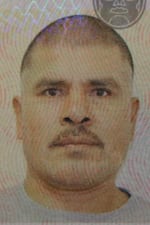Spanish version (Versión en español): ICE Planea Deportar A Inmigrante De Oregón Con 5 Hijos, Sin Antecedentes Criminales
Roman Zaragoza-Sanchez left his home in Sandy, Oregon, at 6:50 a.m. It was Valentine’s Day.
His job, at the Ekstrom and Schmidt Nursery, was a few minutes' drive away. His wife, Rosalina, made him a cup of coffee with breakfast to go and packed him a sack lunch. Zaragoza-Sanchez always left early for work.
“He likes to be on time,” Rosalina said in Spanish. “He’s very responsible.”
She hasn’t seen him since that morning.

Rosalina Guzman holds a photo of her and her husband, Roman, from their wedding day.
Amelia Templeton / OPB
Roman Zaragoza-Sanchez first came to the United States as a migrant worker in the 1990s. On a trip back to Mexico, he met and married Rosalina. A framed photo on their wall shows them standing in front of a lilac-colored wall: Rosalina in an elaborate wedding dress, Roman wearing a dark suit and looking serious.
Roman and Rosalina are both from the Mixtec indigenous group and were born in Oaxaca, Mexico. It’s a mountainous state, among the poorest in the country. They speak Mixtec at home, and Spanish is their second language. Rosalina never learned to read or write.
In 2001, they paid a coyote — a person who specializes in smuggling immigrants into the country — to help them cross the U.S. border illegally.
“We came here because we didn’t have food,” Rosalina said. “The situation in Mexico was difficult. We heard that if we came here to the United States, there would be work here.”
They moved first to Fresno, California, and then to Oregon. Rosalina gave birth to four sons and one daughter. The children now range in age from 6 to 15 years old. The children were born in the United States, making them U.S. citizens. They attend school in the Oregon Trail School District.
On Feb. 14, Zaragoza-Sanchez was supposed to pick up his oldest son after school. Rosalina was planning to cook a special meal to celebrate Valentine’s Day.
Instead, an hour after he left for work, Roman called Rosalina. He said Immigration and Customs Enforcement officers had pulled him over and arrested him just a few blocks from home.
It happened so quickly he left his Honda on the shoulder of Highway 26, with the lights on. Rosalina didn’t have the keys and doesn’t know how to drive. In shock, she asked a neighbor to help her hire a tow truck to retrieve it.
“They are reporting in the news that they are going to get only people who are criminals, but it is not the truth because my husband is not that person,” Rosalina said. “And they took him.”
Zaragoza-Sanchez is now at the Northwest Immigration Detention center in Tacoma, Washington.
Related: ICE Confirms 11 Immigration Arrests Near Woodburn, Oregon
Zaragoza-Sanchez’s arrest, along with a recent immigration raid in Woodburn, Oregon, illustrates the expanding categories of undocumented immigrants federal officials are targeting for arrest and deportation.
Most significant, ICE has confirmed that in Oregon it has arrested and detained Roman Zaragoza-Sanchez and at least four immigrants in the Woodburn raid who do not have criminal records aside from offenses related to their entering the country illegally.
These cases appear to validate the concerns of immigration activists, who say President Donald Trump's recent executive order on immigration, and two Department of Homeland Security memos that followed it, effectively make all 11 million people who have entered the country illegally into potential targets for deportation.
“The executive order essentially says there are no priorities, that every non-citizen is a priority,” said Stephen Manning, a Portland immigration attorney.
“What I do think we’re seeing on the ground is a communication that has taken place from the federal executive to agents in the field to be extremely aggressive,” Manning said, “even at the expense of rational policing and at the expense of constitutional constraints.”

Roman Zaragoza-Sanchez picks strawberries in an undated family photo.
Amelia Templeton / OPB
Circumstances Around The Arrest
In his many years in the United States, Zaragoza-Sanchez appears to have only crossed paths with the local police once, when an officer in Sandy pulled him over in 2015 and gave him a warning for driving without a valid license.
Rosalina describes him as a homebody, a family man who likes to take his children to the park. “My children are sad, because our home is not the same with out him,” she said.
Jim Ekstrom owns the Troutdale nursery where Zaragoza-Sanchez worked.
“He was a quiet employee. He was willing to do whatever we needed him to do,” Ekstrom said.
He said he trusted Zaragoza-Sanchez. “I really feel sad for him, especially,” Ekstrom said. “It makes me just wonder what the future holds for employees in the area.”
Ekstrom said he understands ICE agents have a job to do. “They’re employed to do something, and now they have the right to do it,” he said.
But he also knows how heavily nurseries and farms in Oregon rely on immigrant labor.
“Without labor, we can’t farm,” he said.
Two weeks have gone by since Zaragoza-Sanchez was stopped on his way to work, and Ekstrom hasn’t yet found a worker to replace him. “We lost a good employee,” he said.
Although he only had one interaction with local police, over the years, Zaragoza-Sanchez has had several encounters with federal immigration authorities.
Sometime in the '90s, when he was still a single young man, Zaragoza-Sanchez was in a group of migrant workers stopped near a labor camp outside Roseburg, Oregon.
According to his family and his attorney, he was released and told to appear in court in Portland. But Zaragoza-Sanchez was in Oregon for a short-term seasonal job and never received the summons. When he didn’t appear, in 1994 an immigration judge issued a deportation order for him in absentia.
In 2008, the family said they encountered immigration officials a second time. Several agents showed up at their home in Sandy, Oregon. The agents were searching for a man with a criminal record and had received a tip that he was living at that address.
Rosalina, who was home at the time, let the agents in. She said she answered their questions truthfully. She told them that her husband was not the man they were searching for, but admitted she and her husband had crossed the border illegally. She showed them her husband’s ID and called him at work to tell him to come home.

Zaragoza-Sanchez in a 2015 passport photo
Amelia Templeton / OPB
According to Rosalina, the agents deliberated over what to do. Eventually, they decided that Zaragoza-Sanchez was not the man they were looking for. They noted the family had several children, and they told Rosalina they were letting her and her husband stay.
Rosalina said that was their last contact with ICE until her husband’s arrest two weeks ago.
Immigration and Customs Enforcement declined a request for an interview about Zaragoza-Sanchez’s arrest and detention.
A spokeswoman said the agency does not give interviews regarding individual cases, for legal reasons.
But the agency did confirm one key part of the family’s account: their assertion that Zaragoza-Sanchez has no criminal record and was stopped by ICE solely because of his immigration status and a deportation order more than two decades old.
“Relevant databases indicate Mr. Zaragoza-Sanchez was never lawfully admitted to the U.S. He remains in ICE custody at the Northwest Detention Center pending removal from the U.S. to Mexico,” the ICE spokeswoman said.
ICE officials also said they are not authorized to answer questions about President Trump’s executive order on immigration, and have to refer reporters to fact sheets about the order posted online.
Asked why Zaragoza-Sanchez was a priority for removal from the United States, they referred OPB to the following statement posted as part of an FAQ on the Department of Homeland Security website:
“Under this Executive Order, ICE will not exempt classes or categories of removal aliens from potential enforcement. All of those present in violation of the immigration laws may be subject to immigration arrest, detention, and, if found removable by final order, removal from the United States.”
ICE officials also pointed to language in President Trump's executive order which states that the agency should prioritize deporting any immigrants with outstanding deportation orders.

Rosalina Guzman sits with her youngest son. She and her husband, Roman, have five children who were born in the United States and are citizens.
Amelia Templeton / OPB
A Family Separated
Since the arrest, Rosalina has been afraid to leave her house. She said she is crippled by uncertainty and worried she will be arrested, too.
“I am desperate,” she said. “I don’t know what to do.”
When the doorbell rang unexpectedly during an interview with OPB, she froze and held a finger to her lips.
She waited to get a text confirming her visitors were relatives there to offer condolences before she opened the door.
“My oldest son has told me not to leave the house,” she said, adding that her son, 15, says “'If they catch you, Mama, what we will do?'”
The family relied entirely on Roman Zaragoza-Sanchez’s income from his job at the nursery. They do not have savings.
With him gone, the family is relying on financial help from friends and relatives. Zaragoza-Sanchez’s co-workers collected money for the family, and Rosalina’s brother gave her a loan to pay for an immigration attorney.
Friends from school have dropped off food and groceries, and a teacher has offered to drive the four oldest children to Tacoma to visit their father.
A Case With Broader Implications
President Obama deported millions of undocumented immigrants during his two terms in office. A 2014 data analysis by the New York Times found that in Obama's first term, many of the people deported were not, as the administration claimed, hardened criminals but had committed relatively minor crimes like driving under the influence or traffic violations.
Starting in 2014, the Obama administration established a new deportation program, with more stringent guidelines, that offered some protection to undocumented immigrants who entered a long time ago and integrated into their communities.
Related: Rumors Of Immigration Raids In Oregon Create Panic Among Immigrant Community
That program prioritized deporting people who had committed serious crimes or who had crossed the border more recently.
President Trump’s recent executive order similarly prioritizes deporting immigrants with criminal records. But it also dramatically expands the deportation priorities to other groups, and ICE has said no categories of undocumented immigrants are exempt from deportation.
The order also gives individual ICE agents discretion to decide who constitutes a risk to public or national security.
“Not having any priorities is a very scary thing,” said Manning, the immigration attorney. “It takes what is inherently a very powerful thing to do, to arrest and deport, and it takes it away from folks who are making policy at a national level.”
Manning said the executive order’s sweeping scope, and the power given to individual ICE agents to choose who to target calls to mind the Chinese Exclusion Act of 1882.
“In contemporary times,” he said, “I think it’s unprecedented.”
Zaragoza-Sanchez is just one example of an immigrant who appears to have been arrested under the new broader guidelines.
On Feb. 24, ICE agents stopped two buses of Latino farmworkers outside Woodburn, Oregon.
The men, who are from Mexico and Guatemala, were on their way to their work harvesting flowers.
Immigration and Customs Enforcement called the raid “a targeted enforcement operation” and said its officers were looking for two men who had prior arrests. They found one of the men, but took 10 others into custody.
Of those detained, seven ended up at the detention center in Tacoma and will enter removal proceedings, according to ICE.
Three of the detained men have prior criminal convictions, including battery and driving under the influence.

Roman Zaragoza-Sanchez with two of his children. Zaragoza-Sanchez was arrested by ICE on Feb. 14, 2017, on the basis of a 1994 deportation order.
Amelia Templeton / OPB
The agency confirmed that four of the men picked up in the Woodburn raid, like Zaragoza-Sanchez, have no criminal record.
Roman Zaragoza-Sanchez's family is still holding out hope an immigration judge will be willing to reconsider his 1994 deportation order, under a section of the U.S. Immigration and Nationality Act that allows some exceptions for people who have been in the United States for 10 years or more, and have spouses or children who are here legally.
“I hope they can find in their hearts to at least schedule us for a hearing, so we can make our argument and have Roman testify,” said Job Valverde, the family’s attorney.
“Please release my husband, let him come back, let him go,” Rosalina said. “Do it for his children.”